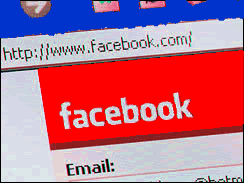 A colleague and I were discussing the recent Facebook TOS kerfuffle and she said she was fascinated by how much privacy people are willing to give away in exchange for a desired experience. I agreed that I am equally fascinated, and that it is vitally important for librarians to be on the vanguard of monitoring these trends, and educating our customers as to the possible risks of sharing too much information.
A colleague and I were discussing the recent Facebook TOS kerfuffle and she said she was fascinated by how much privacy people are willing to give away in exchange for a desired experience. I agreed that I am equally fascinated, and that it is vitally important for librarians to be on the vanguard of monitoring these trends, and educating our customers as to the possible risks of sharing too much information.
But I also think that librarians, at times, can be too knee-jerk about privacy issues, and I wonder if while looking at one end of the Facebook dustup (big corporation trampling on privacy rights) we might be missing some important lessons on the other end (big corporation letting customers control their own information in exchange for a highly engaging experience. And Facebook DOES give customers a tremendous, leading edge, amount of control. See: “10 Privacy Settings Every Facebook User Should Know.)
We all know that people (myself, and probably you included) will share personal information in exchange for a quality experience. We share personal renting and buying habits in exchange for Netflix and Amazon recommendations. We share personal reading habits on GoodReads and LibraryThing to connect with others who share our interests and tastes. We share our credit card numbers with many online vendors in exchange for the convenience of “one-click” ordering.
We know all this, and we personally experience the benefits, but librarians still seem generally loathe to let our customers share their personal information in exchange for anything. We don’t just protect customer privacy, we paternalistically protect it from the customers themselves, rendering them childlike. Our privacy philosophy often reduces down to, “We know better”, or “You can’t be trusted with that–you’ll hurt yourself.”
 Our choice to disallow customer control of their own information means that their needs for connection and social networking go unmet, which in turn creates opportunities for entrepreneurial companies like Library Elf, GoodReads, and LibraryThing (created by frustrated library lovers, I wonder?) to come in and fill those needs. Which is great, but why aren’t libraries creating and offering these experiences?
Our choice to disallow customer control of their own information means that their needs for connection and social networking go unmet, which in turn creates opportunities for entrepreneurial companies like Library Elf, GoodReads, and LibraryThing (created by frustrated library lovers, I wonder?) to come in and fill those needs. Which is great, but why aren’t libraries creating and offering these experiences?
I worry every day about whether libraries will be relevant, three, five, or ten years from now. Unless we start allowing our customers to make decisions about their own personal data, AND start building systems that offer them a social networked experience based on their ability to selectively share their heretofore private info, I fear that libraries will grow increasingly irrelevant to our customers.
Note: See some great discussions in the comments section of the original post at: http://librarygarden.net/2009/02/19/what-libraries-can-learn-from-facebook/